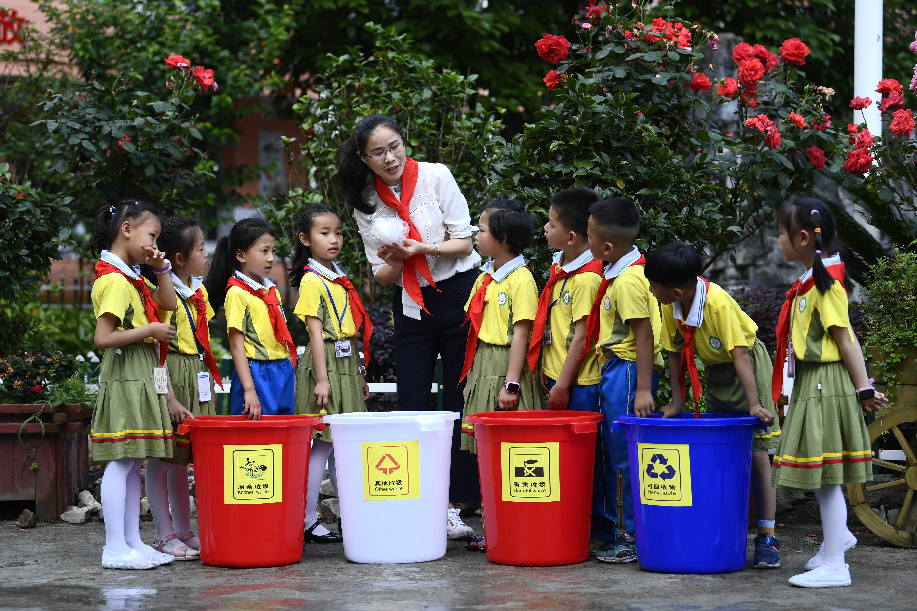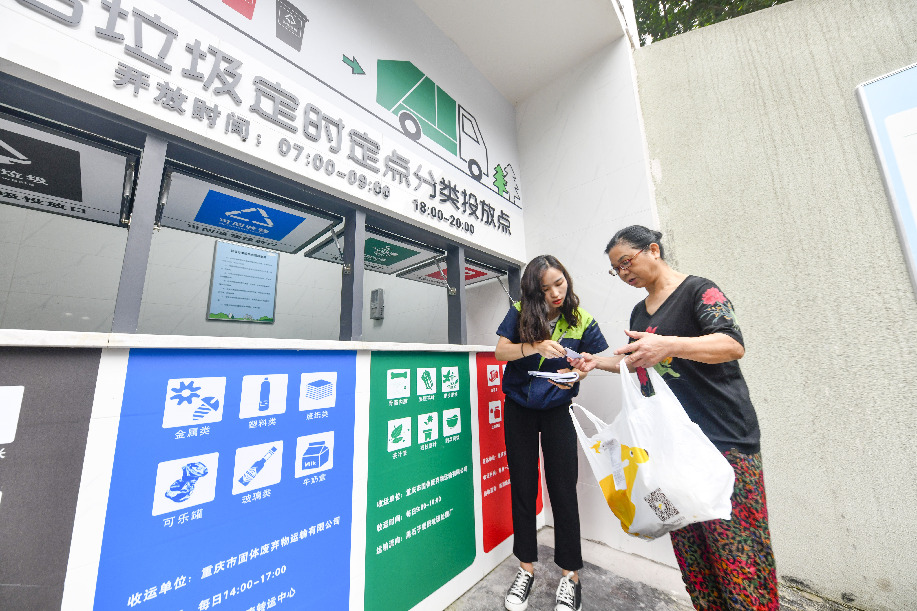by Xinhua writers Wu Shuguang and Gu Yu
BEIJING, June 28 (Xinhua) -- For Li Wanhai, collecting garbage was a bleak business a few years ago, but it turned out to be a promising profession this year as garbage sorting became a focus in many parts of China.
Li, 57, is a garbage collector for AiFenLei, a WeChat mini program engaged in online garbage collecting, sorting and recycling services.
Every day, Li and his three colleagues can receive around 40 online orders and collect 600 kg to 1,000 kg waste from five large residential communities in Beijing's Changping District.
"The job is flexible and meaningful," said Li, who earns around 7,000 yuan (about 1,017 U.S. dollars) per month.
There are 60 collectors, 60 supervisors, 30 sorters, and 30 publicity officers now in AiFenLei, but there were only four collectors when Li joined the company a year ago after giving up his previous job as a ride-hailing driver.
The ubiquity of smart-phones in China poses great potential in incorporating waste sorting to the online world. AiFenLei is among a growing number of companies which have turned to online garbage disposal solutions.
"We are hiring more people involved in the industry to meet the growing demand," said Xu Yuanhong, general manager of AiFenLei.

Pupils learn garbage sorting knowledge from a teacher at a primary school in Taijiang County, southwest China's Guizhou Province, June 5, 2019. Various activities were held across the country to raise people's awareness of garbage sorting and help them develop the habit of waste classification. (Xinhua)
China has recently been pushing hard to cultivate the good habit of garbage sorting. According to the government, garbage sorting systems will have been built in 46 major Chinese cities by the end of 2020, and all cities at the prefecture level and above should have built such systems by 2025.
The stricter garbage sorting rules have yielded more job opportunities, turning the trash into cash.
Qiao Junsuo, 40, a garbage truck driver in Beijing's Chaoyang District, is happy with his decision to quit his previous job as a taxi driver for ten years. He is content with his current monthly salary of 4,300 yuan, along with social insurances and a housing fund.
"I'm glad to see that more and more people are aware of the importance of waste sorting, and I hope the authorities pay more attention to recycling. The booming industry means that I could earn more to raise my three kids," Qiao said.
Usually, Qiao drives to the incinerator in the suburbs once or twice a day, carrying 15 tonnes of waste each time. There are about 80 garbage truck drivers like Qiao in the district.
Beijing generates nearly 26,000 tonnes of household garbage every day, about 1.1 kg per person, and the amount is still rising, Sun Xinjun, head of Beijing municipal commission of urban management, said in a recent TV show.
"If garbage collection is not timely, there will be a huge impact on residents' daily lives," Sun said.
In Shanghai, the amount of garbage from people's daily lives has exceeded 9 million tonnes last year, putting huge pressure on the environment and sustainable development.
Many residents turn to online waste collectors for help. According to state broadcaster CCTV, a waste collector in Shanghai can earn over 10,000 yuan every month depending on how much waste they collect.

Garbage classification inspector of Chongqing Environment & Sanitation Group Lu Xing (L) provides consultation service of garbage classification to a resident at a community in Jiulongpo District in Chongqing, southwest China, June 27, 2019. (Xinhua)
In 2000, China began to pilot garbage sorting in eight cities including Beijing, Shanghai, Guangzhou, and Shenzhen by installing assorted waste bins on the streets. However, there is a still long way to go after two decades.
About 92.2 percent of the public recognized the importance of garbage sorting for environment protection, while only 30 percent of the respondents out of over 13,000 interviewees thought they are doing very well, or relatively well, according to a survey conducted by the Policy Research Center for Environment and Economy under the Ministry of Ecology and Environment.
Wu Shunze, director of the research center, said the government should take concrete measures to promote garbage sorting via policy-making. Based on the increasing amount of garbage, garbage sorting businesses need more professionals and might take generations to form a good habit.
Garbage sorting is a long-term process, and thus requires a step-by-step effort in China, said Liu Jianguo, an environment professor at Tsinghua University.
(Xinhua correspondents Cheng Lu, He Xiyue and Qin Jing also contribute to the report.)



